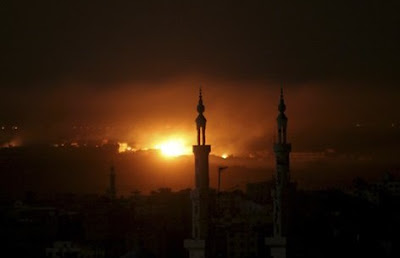
GAZA CITY, Gaza Strip (AP) - Israeli forces pounded rocket-launching sites and smuggling tunnels in Gaza Saturday and planes dropped leaflets warning of an escalation in attacks, as Palestinian militants fired at least 10 more rockets at Israel.
Egypt hosted talks aimed at ending the violence.
Flames and smoke rose over Gaza City amid the heavy fighting. The Israeli threat to launch a "new phase" in its two-week-old offensive that has already killed more than 800 Palestinians came in defiance of international calls for a cease-fire.
"The IDF (Israeli Defense Forces) will escalate the operation in the Gaza Strip," the leaflets said in Arabic. "The IDF is not working against the people of Gaza but against Hamas and the terrorists only. Stay safe by following our orders."
The leaflets urged Gaza residents not to help Hamas, the Islamic militant group that rules Gaza, and to stay away from its members.
Israel launched the offensive on Dec. 27 to halt years of Palestinian rocket attacks on southern Israel. A week later, ground troops moved in.
The dropping of the leaflets appeared to be partly a psychological tactic. Israeli defense officials say they are prepared for a third stage of the offensive, in which ground troops would push much further into Gaza, but are still waiting for approval from the government.
The officials, speaking on condition of anonymity because they were discussing classified information, said the army also has a fourth stage planned that calls for a full reoccupation of Gaza and toppling of Hamas.
The Israeli military said more than 15 militants were killed in overnight fighting. It said aircraft attacked more than 40 targets including 10 rocket-launching sites, weapons-storage facilities, smuggling tunnels, an anti-aircraft missile launcher and gunmen.
In the day's bloodiest incident, an Israeli tank shell killed nine people in a garden outside a home in the northern Gaza town of Jebaliya. Separately, a woman was killed by tank fire in the nearby town of Beit Lahiya.
Israel has come under international criticism for the rising number of civilian casualties. Paramedics said the nine people killed in the garden were from the same clan and included two children and two women.
"Residents brought them to the hospital in a civilian car. They put them all in the trunk because their bodies were mangled," said hospital administrator Adham Hakim.
The Israeli army had no immediate comment, but has repeatedly accused Hamas of using civilians as human shields and launching attacks from schools, mosques and homes. Earlier this week, an Israeli attack outside a U.N. school killed nearly 40 people. Both Israel and Palestinian witnesses said militants carried out an attack from the area moments earlier.
Palestinian medical officials say roughly half of the more than 800 Palestinians who have been killed were civilians. Thirteen Israelis have been killed. Five soldiers were lightly wounded in Saturday's fighting.
Israel and Hamas ignored a U.N. resolution passed Thursday calling for an immediate and durable cease-fire that would lead to the withdrawal of Israeli troops from Gaza.
Israel has dismissed the Security Council resolution as impractical, while Hamas, whose government in Gaza is not recognized internationally, is angry it was not consulted in the diplomatic efforts.
In Cairo, Egypt, the Palestinian Authority president urged both Israel and Hamas to agree to an Egypt-brokered truce Saturday.
After meeting Egyptian President Hosni Mubarak, Mahmoud Abbas stressed that there was no time to waste in ending the bloodshed in Gaza, home to 1.4 million people.
"If any party does not accept it (the truce), regrettably it will be the one bearing the responsibility, and if Israel doesn't want to accept, it will take the responsibility of perpetuating a waterfall of blood," Abbas said.
Hamas officials from both Gaza and Syria are also in Cairo for separate talks with Egyptian officials on a truce. Israeli officials visited Cairo earlier this week.
Hamas and Abbas's Fatah party, which dominates the West Bank, are fierce political rivals, but the president still claims authority over Gaza. Hamas violently took control of the Gaza Strip in 2007.
Palestinian security officials said some of the heaviest fighting Saturday occurred on the strategic coastal road north of Gaza City, home to 400,000 Palestinians. Israeli forces moved to within about 1 mile of the city before pulling back slightly.
While Israel has largely taken control of the road, militants operate from hidden positions in the area. The road is often used to fire rockets into Israel or attack Israeli navy boats off the Mediterranean coast.
At least 10 rockets landed in Israel on Saturday, the army said. One rocket hit an apartment building in the southern city of Ashkelon, lightly wounding two people and causing extensive damage to the structure.
The offensive has caused extensive damage throughout Gaza. The United Nations estimates two-thirds of Gaza's 1.4 million people are without electricity, and half don't have running water.
The Israeli military announced a three-hour halt to operations in Gaza on Saturday to let besieged residents leave their homes and stock up supplies. Medics use the lull to rescue casualties, and aid groups also rush through food distribution.
But for the second straight day, there were reports of continued fighting during the lulls.
Israel has called for the 3-hour breaks in fighting for the past four days. But aid groups say it isn't enough time to do their work.
Salam Kanaan of Save the Children said that in previous lulls, the agency distributed food to 9,500 people - far short of the 150,000 people it serves.
U.N. official Adnan Abu Hasna said the Palestinian refugee agency would distribute aid to about 40,000 people, half of them holed up in U.N. schools that have been transformed into shelters.
All deliveries were coming from supplies already in Gaza. U.N. officials said a halt on aid shipments into Gaza through Israeli-controlled border crossings remained in effect. The ban was imposed Thursday after a U.N. truck driver was shot and killed by Israel. It was unclear when the deliveries will resume.
"As each day goes by, and for each moment that the cease-fire demanded by the Security Council is not observed, the crisis continues," said U.N. spokesman Chris Gunness.
U.N. Secretary-General Ban Ki-moon spoke with Israeli Prime Minister Ehud Olmert by phone on Friday and told the prime minister that he was disappointed the violence was continuing in disregard of the resolution, according to Ban's office.
Israel says any cease-fire must include assurances that Hamas will halt attacks and end the smuggling of weapons into Gaza through the porous Egyptian border.
Hamas has said it won't accept any cease-fire deal that does not include the full opening of Gaza's border crossings. The U.N. resolution emphasized the need to open all crossings, which Israel and Egypt have kept sealed since Hamas militants forcibly seized control of the territory 18 months ago.
Israeli leaders oppose that step because it would allow Hamas to strengthen its hold on Gaza. (
source)










